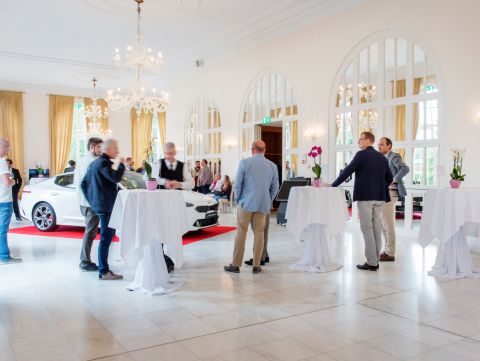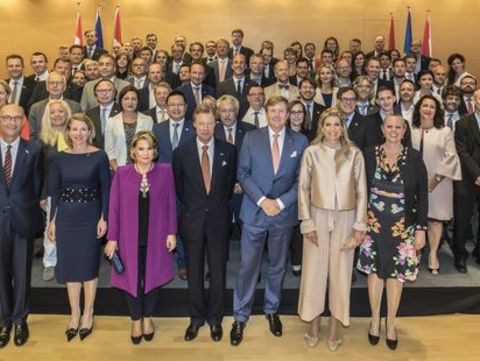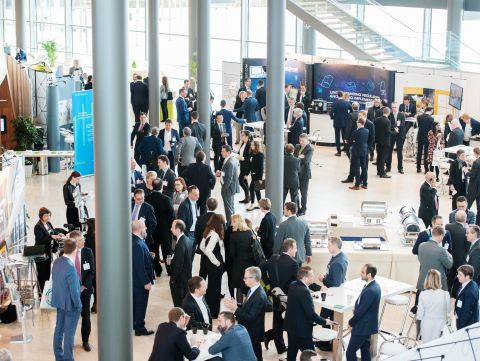Bringing more sustainability to the events industry
Prior to Covid, sustainability was becoming a priority in the events industry. What about now? Will future events be organised with an eye on environmental and social impacts? Sustainability and how it applies to the events industry was the topic of the panel discussion ‘Sustainability Infrastructure to Bring Back Green’ that was held at the European Convention Center Luxembourg on 3 November.
The discussion was part of the 59th ICCA Congress 2020, for which Luxembourg served as regional co-host. The panel was moderated by Didier Scaillet, Director of the Events Industry Council, and it included three speakers who brought their insight and experience from the fields of city management, tourism and conventions, and ecological consultation.
Luxembourg City and sustainable mobility
Speaking in person was Serge Wilmes, Chief Alderman of Luxembourg City. He emphasised the city’s commitment to sustainability, notably in the realm of mobility, which features greatly in the planning and management of events. Luxembourg is currently the only country in the world to offer free public transportation, a scheme that officials believe will reduce the number of cars on the road. Also, Luxembourg City has a highly developed bicycle share programme, with both electric and pedal bikes, that further encourages people to leave their cars at home, Mr Wilmes said. These programmes encourage participants in events to take public transport, a key part of any sustainability plan.
Sustainability in Copenhagen: a case study
Kit Lykketoft, Director of Convention at Wonderful Copenhagen, joined virtually. She says that not only is sustainability still a priority of the events sector, but that ‘it will be a big part of the answer when the fog lifts’. She contends that people will be more eco-conscious following Covid, especially young people for whom tackling climate change is of utmost importance. It’s therefore up to the industry to show how it’s done and ‘walk the talk’, she said.
Ms Lykketoft pointed to Copenhagen, which is set to be carbon neutral by 2025, as a prime example of how sustainability can become a central, permanent feature. ‘It’s part of the way we live here. We have more bikes than people,’ she said. This way of life is being extended to the tourism and events industry in Copenhagen thanks to the Tourism for Good initiative which was created a few years back. In regards to events, a guide has been created to make them more sustainable, and the city has created an app that guides visitors to make sustainable choices when moving around the city.
An environmental advisor’s perspective
Also present was Isabelle Schummers, an environmental advisor at Oekozenter Pafendall in Luxembourg City. She says that following the emergence of Covid, some positive changes have occurred. First, people generally are more committed to supporting local food chains and businesses. Also, people are travelling less, which has obvious benefits for the environment. On the other hand, we’ve seen a massive resurgence in the use of single-use products and plastic wrapping, she says.
In regards to the events industry, which usually involves plenty of air travel, catering, and other activities that generate waste, Ms Schummers says we need to organise events that don’t compromise health, not just for now, but for the future. A key problem is plastic, she says, which has been demonstrated to negatively impact our health, especially now that it has infiltrated the food chain. She applauds the events industry for showing resilience and creativity in the face of Covid, but there is still much to be done to make events more sustainable, she says.
Concrete steps forward
Ms Schummers says we need to invest in sustainable local infrastructure and services, for example, having local washing facilities so that dirty bed linens, tablecloths, and napkins don’t need to be transported long distances. Also, the industry should move away from single-use items and invest in reusable dishes, glasses, and cutlery. ‘We need to ask ourselves how to make change more systematic’, she said. Ms Lykketoft contends that relocalisation – moving sites of production closer to sites of consumption – should and likely will play a bigger role in the future. Mr Wilmes says that a vision of relocalisation can be seen in Luxembourg, where the platform Letzshop was created to capitalise on the online shopping boom, support local products, and compete with international shipping.
Key points
- Luxembourg has made significant progress in regards to sustainability, particularly in the realm of mobility, which is a key feature of events planning and management.
- Copenhagen provides a great example of how a city can weave sustainability into the social fabric.
- Major changes in how events function, such as re-thinking how cleaning and catering services operate, are required for the events industry to become more sustainable.





